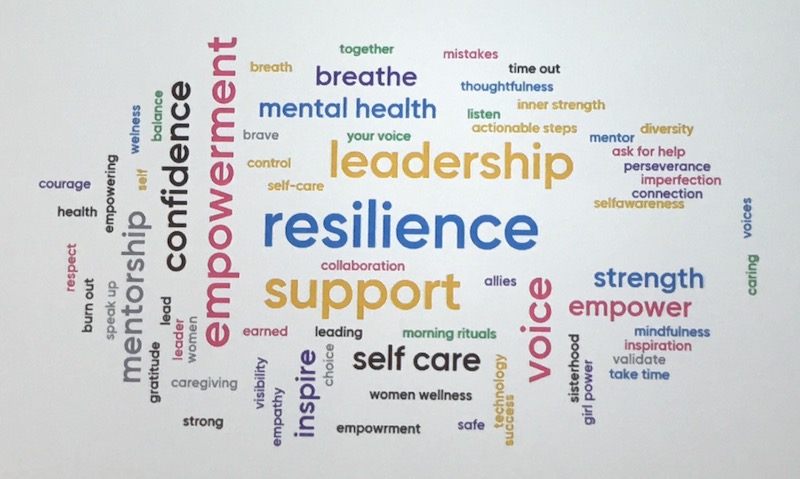Can you be resilient, but not empowered? Or empowered, but not resilient?

The picture for this post is a wordle that happened in real time at the end of the Global Women 4 Wellbeing (GW4W) event hosted by CBS Network on June 18. A cross section of leaders from various backgrounds and experiences overwhelmingly put resilience as key to leading well and their big take away from the discussion. But if you look closely, the words empowerment, empower, and empowering sit all around the word resilience.
In an information overloaded world being able to bounce back from mistakes, cut through the noise to identify what is important, and be clear about when to say ‘yes’ or ‘no’ to a project, solution, or advancement requires being empowered to make decisions that support personal health and wellbeing.
It isn’t just about resilience.
But being empowered may mean different things to different people in an organization. Some of the synonyms for empower are legitimize, entrust, vest and allow. Allow implies that someone in authority gives permission. Vest has a different meaning, as in vested rights. These are subtle but important differences.
For many leaders, particularly new ones, allowing themselves to focus on being vested in their own health and wellbeing isn’t generally talked about openly. It is often thought of as “nice to have” versus being key to their success. This often becomes more challenging for female leaders. There is a huge issue around how female leaders, who also take on the role of caregiver, are viewed: “Why are they leaving early?” “Why do they need more work from home time?”
There’s a need for a more balance.
For those that aren’t caregivers, there is sometimes resentment and a feeling that there is inequity in how flex time is approved or work from home opportunities are granted. Some women, if they don’t have the responsibilities for children, will go the other direction and work 24/7/365. Making sure there is a more balanced approach to the approval process by an organization for flex and work from home time is important. Helping leaders understand what they need to be resilient is key to the overall success of the company. This includes having a clear understanding of the resources a company provides their leaders so they can be resilient.
It is not uncommon for women in the workplace to feel even more pressure to be seen as engaged and productive. They will often put their own health and wellbeing last, ignoring warning signs, and pushing themselves into a very unhealthy place. They may feel they cannot make themselves a priority which often means their levels of resilience are not what they need them to be. If that is the message in your workplace, consider what needs to happen to make a positive change.
One of our members has shared her cautionary tale so that other female leaders don’t make the same mistake. She owns two businesses, is highly educated and is married with two children. Despite having a severe headache that wouldn’t go away, she ignored it. She ended up having a stroke at age 38 due to an arteriovenous malformation (AVM). She is now recovered, after 5 years. Her businesses are thriving and she will have many years of building memories with her family. But that might not have been the case. She was very lucky. She could have lost everything, including her life.
If you are a female leader at any level, to succeed in the long-term, you have to make your health and wellbeing a priority.
You cannot be resilient if you are not empowering yourself to make your health and wellbeing key to your success. And, as a leader, it is important to visibly role model for others.
Here are a few tips from our GW4W Network:
- Make sure you are going for your annual exams and have a good relationship with your personal physician. Your physician or health professional is part of the team that ensures you can be the leader you are meant to be.
- Take time to truly listen to your body. If your engine light goes on in your car, you don’t drive another 100 miles. Any major pain, particularly if it is a sudden onset, needs to be addressed right away.
- If a colleague is ignoring a major symptom and you think they are in crisis, speak up. Insist they go to the doctor or emergency room. You could save a life.
- Make your own health and wellbeing a priority everyday. It can mean getting a ½ hour of more sleep a night, spending time with a friend that truly has your back, eating lunch away from your desk, taking hourly 2 minute stretch breaks, more outdoor time, scheduling vacation time. It’s what works best for you. Whatever you decide, commit to it.
Put the following question on your calendar to pop up once a week: ‘Do I feel like I am as resilient as I want to be on a daily basis?’
If not, it’s time to commit to one actionable thing you can do consistently for yourself so you can be. We invite you to do it today.
If your workload and/or workplace does not allow you to support your needed level of resilience, consider the price you may end up paying. You deserve good health and wellbeing, and to be empowered.
You deserve the time to support your resilience so you can be the leader you are meant to be.
